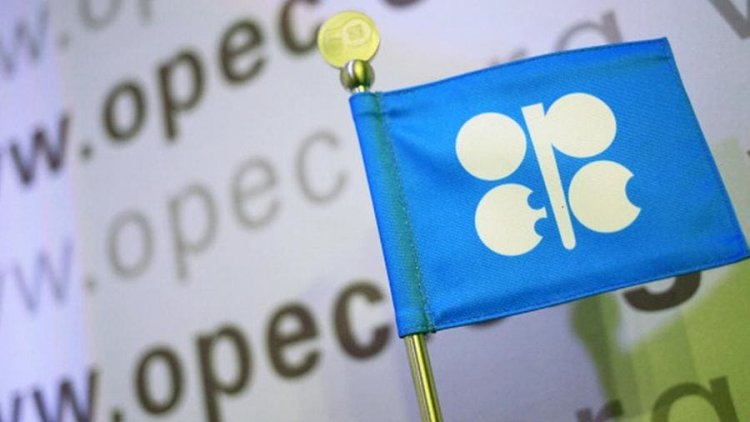Oil Surges, Stoking New Inflation Headache, Following OPEC Production Cuts
Cooling inflation had markets betting that the Fed might slow the pace of rate hikes, but OPEC's surprise production cuts present a new inflation headache.

Cooling inflation had markets betting that the Fed might slow the pace of rate hikes, but OPEC's surprise production cuts present a new inflation headache.
Updated at 8:34 am EST
Global oil prices surged higher Monday following a surprise move by OPEC members to add more than a million barrels per day to the cartel's existing production cuts in a move that could stoke lingering inflation concerns in the U.S. economy.
In a decision that pre-empts a meeting of OPEC members, as well as non-member allies such as Russia, slated for today in Vienna, nine members of the group unveiled plans to cut a further 1.66 million barrels of oil from its total daily output.
The agreement means OPEC+, which includes Russia, is taking nearly 3.4 million barrels of crude from the market each day, a level that's equivalent to around 3.7% of daily global demand.
The cuts will begin in May and extend until the end of the year, with Saudi Arabia leading the group by reducing its supply by 500,000 barrels per day. Algeria, Gabon, Iraq, Kuwait, the UAE, Oman and Kazakhstan were also named as OPEC members that followed the Saudi lead.
ING's head of commodity strategy, Warren Patterson, argues that Saudi Arabia and other OPEC members are more comfortable cutting production now given that U.S. majors focus on capital discipline and shareholder returns over drilling acceleration.
"In previous years, OPEC+ would have been hesitant to push prices too high, with the fear that it would lead to a strong supply response from US producers," he said. "However, it is clear that US output growth is much more modest these days, with a change in mentality from US producers. Gone are the days of pumping as much as possible."
WTI crude futures for May delivery, which are tightly-linked to U.S. gasoline prices, were marked $4.58 higher from Friday's closing levels in overnight trading at $80.25 per barrel. Brent contracts of June delivery, the global pricing benchmark, surged $4.90 to $84.80 per barrel.
"US production growth is slowing leaving more power in the hands of OPEC hence the much more proactive stance seen in recent months," Saxo Bank strategists wrote. "They may see a slower than expected pickup in demand from China and ultimately managing to squeeze short sellers out of the market in the process was probably a bonus in their view."
The OPEC move also lifted Treasury bonds yields, and firmed-up the U.S. dollar, as investors looked to the inflationary aspect of richer crude prices over the summer and autumn months.
That comes, ironically, after a softer-than-expected reading for the Fed's preferred inflation gauge on Friday, the PCE Price Index, for the month of February, which helped power U.S. stocks to solid end-of-quarter gains.
Benchmark 2-year Treasury note yields were marked 2 basis points higher at 4.108% in European trading while 10-year notes were pegged at 3.536%. The U.S. dollar index, which tracks the greenback against a basket of six global currencies, was marked 0.1% higher at 102.606.
“The dramatic cut will only add to pressing global inflationary squeezes," said Nigel Green, CEO of London-based financial advisory deVere Group, who argues price increases will "reduce consumers’ purchasing power, disrupt supply chains, and lead to higher inflation expectations.”
“There’s real concern that the surprise decision announced by Saudi Arabia for OPEC+ will prompt central banks to maintain interest rates higher for longer, due to the inflationary impact, which will hinder economic growth,” he added.
The potentially inflationary bump from higher crude prices is already filtering into Fed rate forecasts, with the CME Group's FedWatch now indicating a 62% chance of another 25 basis point rate hike in May and a 59.2% chance that Chairman Jerome Powell and Co. will hold that rate in place through June.
The OPEC decision is also likely to revive calls for legislation to limit the cartel's influence on global oil markets.
Last month, Republican Chuck Grassley and Democrat Amy Klobuchar reintroduced the so-called No Oil Producing and Exporting Cartels bill, better known as NOPEC, to a Senate Judiciary Committee following years of failed attempts to bring the 13-member group closer in line with U.S. law.
"Current law has made the Justice Department powerless to stop the 13 largest oil-producing countries from manipulating prices and driving up costs," Klobuchar said, referencing the group's decision last year to slash output by around 2 million barrels per day despite the impact of prices from Russia's ongoing war on Ukraine.
What's Your Reaction?



























































